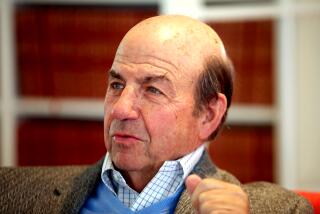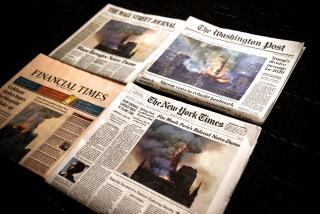Ambrose told the stories from history that we needed to hear
- Share via
These days, much of the American press is more often than necessary a school for scandal. Hence, the begrudging quality of so many of the obituaries for historian Stephen Ambrose, who died this week at 66.
While The Times and other major newspapers took a balanced approach to the best-selling writer’s remarkably prolific career, the more common journalistic template looked something like this: a first paragraph recording his death; a second paragraph noting that he was a longtime smoker and died of lung cancer (in other words, he brought it on himself); and finally, a third paragraph recounting the allegations of plagiarism leveled against him over a few frenzied weeks earlier this year.
The Boston Globe went so far as to report the charges as facts. Ambrose, the paper, wrote, “drew widespread attention ... over revelations that he had plagiarized a number of brief passages in at least five of his books.” To its credit, the Globe went on to report that in every instance, Ambrose had cited the source of the allegedly appropriated passage in his end notes. It also quoted the historian’s initial response to the allegations:
“I always thought plagiarism meant using other people’s words and ideas, pretending they were your own and profiting from it. I do not do that, never have done that and never will.”
Quite right. And Ambrose never did.
What he did do on about 10 of the roughly 15,000 pages he published was paraphrase brief passages and borrow direct historical quotations from previously published works. Those books were cited without exception among the more than 24,000 footnotes arrayed throughout his books.
All synoptic, narrative historians, which is what Ambrose was, paraphrase from other sources. If the standards laid down by his most rabid critics were applied to the four Evangelists, the three Synoptic Gospels would have to be denounced as acts of plagiarism--as would a substantial and revered part of the extant medieval corpus.
The notion that the first writer to record a fact, quote a conversation or uncover a letter somehow owns that moment in time entirely and forever reduces historical scholarship to a kind of intellectual land rush.
It also makes the composition of readable historical narratives all but impossible. Ambrose, in fact, was part of a new generation of vigorous narrative historians, including David McCullough, Doris Kearns Goodwin and Joseph Ellis, who have made writerly works on serious historical subjects a fixture on bestseller lists during the past few years. (The problems surrounding the latter two involve issues wholly separate from those considered here.)
Ambrose is due particular credit for giving the individual stories of the average men whose collective effort defeated fascism the epic treatment they deserve.
Publisher Max Rudin, whose Library of America has collected the work of Francis Parkman, the archetypal American narrator, believes the new synoptic historians have responded to a deep public hunger.
“After Francis Parkman’s time in the 19th century, academic history moved toward the monograph and away from narrative storytelling,” Rudin said. “First movies and then television picked up that popular narrative function. But, by the ‘50s and ‘60s, a serious gap had opened. There was no well-written, intelligent history for a broad audience. Academics had become more specialized, and other storytelling media began to dumb down the subject. It was this lack that these popular historians have helped fill.”
At the end of the day, there is something crabbed and small-minded about reducing the life of a historian whose work elevated not only the bestseller lists, but also contemporary cinema to hair-splitting over a handful of paraphrases and footnotes in a 36-volume career.
Long before the plagiarism allegations surfaced, Ambrose told an interviewer that even as a classroom teacher, his approach differed “from the way most academics teach history.” He said he wanted his students to know more about Thomas Jefferson than his relationship with Sally Hemmings. “I want them to know that Thomas Jefferson wrote the Virginia Statute of Religious Liberty.”
Most of his colleagues, he said, simply “teach that Jefferson had a slave mistress and that George Washington was a slaveholder. I want them to know that George Washington led us in war and in peace. In war, he knew if he was captured they were going to send him to London. They were going to put him on trial. They were going to find him guilty of treason, and then they were going to draw and quarter him. I make sure those kids know what drawing and quartering means.”
The Library of America’s Rudin, who reads not only academic histories, but also the work of popular historians--”whenever I’m interested in their subject”--thinks the renewed interest in writerly histories of Ambrose’s sort represents a salutary shift in popular taste. “When historical investigations are written for a general audience,” he said, “there is inevitably a back-and-forth over the story as presented and challenges to its factual and interpretive content. Frankly, there’s no harm in that.
“The dramatic return to narrative history that has occurred over the past few years speaks to people’s need to have a coherent and compelling story to tell themselves and each other about their common past and their relationship to it. I think authors like David McCullough and Stephen Ambrose have filled that need to our people’s great benefit.”
Ambrose’s own plain-spoken verdict on the plagiarism controversy was reported last May in The Times’ story on his fatal illness: “Screw it,” he said. “I don’t know that I’m all that good at academics. I’m a writer.”
More to Read
Sign up for our Book Club newsletter
Get the latest news, events and more from the Los Angeles Times Book Club, and help us get L.A. reading and talking.
You may occasionally receive promotional content from the Los Angeles Times.







